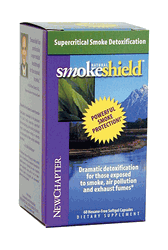|
Abstract
Smoke Shield is a proprietory formulation containing extract of turmeric (Curcuma longa), obtained by supercritical carbon dioxide gas extraction and post-supercritical hydroethanolic extraction, together with extracts of green tea and other spices whose presence synergistically increases the activity of turmeric. This study evaluates the antioxidant potentials of Smoke Shield in-vitro and in experimental animals, as well as in human models. Smoke Shield was found to scavenge superoxide radicals generated by photoreduction of riboflavin (50% inhibitory concentration= 91 gmL-1) and hydroxyl radicals generated by Fenton reaction (50% inhibitory concentration=95 gmL-1) and reduced lipid peroxidation. Administration of Smoke Shield to mice was found to elevate antioxidant enzymes such as catalase and superoxide dismutase in blood as well as in liver and kidney. Glutathione-S-transferase activity was found to be significantly elevated in liver and kidney of animals treated with Smoke Shield. Glutathione levels were also significantly elevated in blood. Glutathione reductase was significantly elevated in kidney. Administration of Smoke Shield decreased the lipid peroxidation in serum, liver and kidney, as well as reduced the levels of conjugated dienes and hydroperoxides. Administration of Smoke Shield to smokers was found to increase the superoxide dismutase and glutathione in blood and decrease glutathione peroxidase. Smoke Shield inhibited phase I enzymes as represented by aniline-hydroxylase and aminopyrenedemethylase in-vitro. These results indicate that Smoke Shield has potent antioxidant activity, could inhibit phase I enzymes and increase detoxifying enzymes, which makes it an effective chemoprotective herbal formulation.
|

